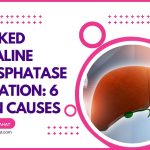Drugs Causing Low & High Alkaline Phosphatase (Chemo, Azathioprine, Thyroid hormone, Tylenol, Metformin, & more).
Our content is not intended nor recommended as a substitute for medical advice by your doctor. Use for informational purposes only.
Alkaline phosphatase is an enzyme in a wide variety of tissues in your body.
The most common types and locations of alkaline phosphatase are:
- The liver and bones (mainly).
- The kidneys.
- The gastrointestinal tract (particularly the small intestine).
- The placenta, & others.
The most common causes of elevated alkaline phosphatase are biliary, liver, and bone diseases.
However, medications can affect the levels of the enzyme. Today, we will answer your questions about the medications that may cause elevations or lower ALP levels.
1 . Drugs that cause elevated alkaline phosphatase.
Drugs cause elevated phosphatase mainly by inducing hepatic cholestasis (bile stasis inside the liver).
Drug-induced cholestasis is a common side effect of many medications. Tell your doctor about recent or chronic medications if you have unexplained alkaline phosphatase elevations.
Common medications that cause elevated alkaline phosphatase include (reference1, reference2):
- Some antibiotics (such as penicillins & erythromycin).
- Some anti-seizure drugs (such as carbamazepine & phenytoin).
- Some antihistamines (such as cetrizine).
- Some heart & hypertension medications (such as captopril, diltiazem, verapamil, etc.).
- Some anti-rheumatoid medications (such as Penicillamine, sulfa drugs, and gold salts).
- Hormonal pills and injections such as OCPs, anabolic steroids, etc.
- Some antipsychotics (chlorpromazine).
- Some anti-diabetes medications (such as tolbutamide).
- Anti-thyroid medications (methimazole).
- Anti-gout medications (such as allopurinol), and others.
The complete list is in the table below:
Drugs that cause elevated alkaline phosphatase | |
| 1. Antibiotics | – Penicillin antibiotics such as ampicillin, amoxicillin, etc. – Nitrofurantoin. – Amikacin, gentamycin. – Sulfonamides. – Erythromycin. – Sulfa antibiotics (TMP-SMX). |
| 2. Anti-epilepsy | – Carbamazepine. – Phenytoin. – Phenobarbital. – Valproate. |
| 3. Heart & Blood pressure Meds. | – CCBs (Verapamil,Deltiazem). – ACEIs (as Captopril). -Quinidine. – Flutamide. |
| 4. Anti-rheumatoid | – Gold salts. – Penicillamine. – Sulfa medications. |
| 5. Anti-histamines. | – Cetirizine. |
| 6. Psychiatric Meds. | – Estrogens (OCPs). – anabolic steroids. – MEthyltestosterone. |
| 7. Diabetes Meds. | Sulfonamides as – Chlorpropamide. – Tolbutamide. – Tolazamide. |
| 8. Anti-gout. | – Allopurinol |
| 9. Others. | – Disulfiram. – Phenylbutazone. – Methimazole. – Thyroxin (thyroid hormone) overdose. |
2. Drugs that cause low alkaline phosphatase.
A.Vitamin D overdose:
people who take too much vitamin d may have hypercalcemia, normal or high phosphorus levels, and normal or LOW alkaline phosphatase levels (
The diagnosis is by assessing the blood levels of vitamin D (often high).
B. Cinacalcet.
It is a medication used to treat hyperparathyroidism in patients with kidney diseases. It causes low alkaline phosphatase levels in people receiving it (reference).
C. Estrogen and other hormonal replacement therapies (as oral contraceptive pills):
Studies show that hormonal contraception such as OCPs (oral contraceptive pills) leads to significantly lower alkaline phosphatase levels.
One study showed that women who use OCPs for more than one year have median alkaline phosphatase levels of less than 30-40 U/L.
These levels are significantly lower than in women of the same age who are not using OCPs (the average in non-user is 87 U/L).
The table below shows the average alkaline phosphatase levels in women receiving OCPs.
Note the duration-dependent decline in alkaline phosphatase levels with prolonged use of OCPs.
3. FAQs about medications and alkaline phosphatase.
A. Alkaline phosphatase levels and chemotherapy (chemo).
Patients with cancer receiving chemotherapeutic drugs may have higher alkaline phosphatase levels.
The high levels of alkaline phosphatase may be due to the chemotherapeutic medications.
The chemotherapy medications often cause elevations in alkaline phosphatase due to their effect on the liver (hepatotoxicity).
Most common chemo medications that may cause liver injury and elevated alkaline phosphatase include (reference):
Mechanism of elevated alkaline phosphatase | Examples of chemo drugs |
| 1. Cholestasis (bile stasis inside the liber): moderate to a marked increase in alkaline phosphatase and bilirubin. | COMMON: – Erlotinib – Floxuridine – Interleukin. RARE: – Azathioprine. – Mercaptopurine – Busulfan – Sorafenib – Chlorambucil – Cytarabine – Docetaxel – Doxorubicin – Etoposide – Gemcitabine – Topotecan – Vinorelbine |
| 2. Biliary structure: moderate to marked elevations in alkaline phosphatase and bilirubin. | – Cytarabine – Floxuridine |
| 3. Hepatitis: often leads to a mild increase in alkaline phosphatase and variable degrees of elevations of liver enzymes. | COMMON: – Asparaginase – Carmustine – Floxuridine – Imatinib – Interferon – Methotrexate – Pazopanib RARE: – Bleomycin – Bortezomib – Busulfan – Capecitabine – Cyclophosphamide – Doxorubicin – Actinomycin. |
| 4. Occlusions of the hepatic veins (veno-occlusive disease): leads to mild to moderate elevations in alkaline phosphatase | – Cyclophosphamide (common) – `Oxaliplatin (common) – Melphalan – MItomycin – Thioguanine – Fluorouracil – Busulfan. |
B. Alkaline phosphatase and azathioprine.
Azathioprine is a chemotherapeutic agent used in many cancers and immune-mediated diseases.
Azathioprine may cause elevations in alkaline phosphatase by inducing liver bile stasis (cholestasis). Also, it may cause occlusions of the hepatic veins (veno-occlusive disease).
The effect of azathioprine on the liver cause elevations in alkaline phosphatase.
C. Thyroid hormones and alkaline phosphatase.
The thyroid hormone excess in your body affects bone metabolism and causes elevated alkaline phosphatase.
Patients with untreated hyperthyroidism (overactive thyroid) or those who receive excess amounts of external thyroid hormone may have mild to moderate alkaline phosphatase levels.
D. Tylenol (paracetamol) and alkalien phosphatase.
Normal doses of Tylenol (paracetamol or acetaminophen) doesn’t seem to affect alkaline phosphatase levels even in patients with chronic liver diseases (reference).
However, Tylenol liver toxicity (by consuming mega doses of the drug) may cause acute fulminant hepatitis with elevated liver enzymes, alkaline phosphatase, and bilirubin.
E. Metfromin and alkaline phosphatse.
The use of metformin doesn’t affect alkaline phosphatase in most people. However, in rare cases, metformin may cause liver affection and elevation of alkaline phosphatase, bilirubin, or liver enzymes.
Also, note that diabetes itself may cause mild elevations in alkaline phosphatase. However, the cause of elevated alkaline phosphatase in diabetic patients is most probably due to the effect of diabetes on bones (diabetic bone disease). Learn More.
- Evidence-based
- Written by a doctor.






